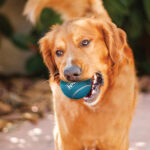
Welcoming a Labrador Retriever puppy into your home is an exciting and joyful time. These adorable furballs are known for their friendly and energetic nature, making them one of the most popular dog breeds worldwide. However, taking care of a Labrador puppy comes with its own set of responsibilities and milestones. This comprehensive guide will walk you through the key milestones and essential care tips to ensure your new family member grows into a healthy, well-adjusted adult dog.
Key Milestones in Raising a Labrador Retriever Puppy
First Vet Visit (6-8 Weeks)
Your puppy’s first vet visit typically occurs at 6-8 weeks of age. During this visit, your vet will conduct a thorough health check, administer the first set of vaccinations, and start a deworming schedule. This initial visit sets the foundation for your puppy’s long-term health and well-being.
House Training Begins (Around 12 Weeks)
House training is a crucial part of raising a puppy. Start potty training around 12 weeks by establishing a consistent routine for feeding, potty breaks, and playtime. Consistency and patience are key to successfully house training your Labrador puppy.
Socialization Period (3-14 Weeks)
The socialization period is a critical time for your puppy’s development. Between 3-14 weeks, expose your Labrador to various environments, people, and animals. Positive experiences during this time will help your puppy grow into a confident and well-adjusted adult dog.
Teething Phase (3-4 Months)
Teething can be a challenging phase for both you and your puppy. It usually starts at 3-4 months. Provide appropriate chew toys to help soothe your puppy’s gums and prevent destructive chewing behavior.
Obedience Training (8-10 Weeks)
Start obedience training as early as 8-10 weeks. Begin with basic commands like “sit,” “stay,” and “come.” Consistent training and positive reinforcement will lay the groundwork for a well-behaved adult dog.
Growth Spurts (4-7 Months)
Expect major growth spurts between 4-7 months. During this period, adjust your puppy’s diet and exercise routine to support their rapid development. Monitor their weight and ensure they are receiving the right amount of food and physical activity.
Adult Teeth (4-7 Months)
Between 4-7 months, your Labrador will start getting their adult teeth. Monitor for retained baby teeth and consult your vet if any issues arise.
Spaying/Neutering (6-9 Months)
Spaying or neutering is typically done between 6-9 months. Consult with your vet to determine the appropriate timing based on your puppy’s health and development.
Full Vaccination Course (16-20 Weeks)
By 16-20 weeks, your puppy should have completed their full vaccination course, including the rabies shot. Keeping up with vaccinations is essential to protect your puppy from common diseases.
Gradual Transition to Adult Food (Around 12 Months)
Around 12 months, gradually transition your Labrador from puppy food to adult food. Choose high-quality, breed-specific food to support their ongoing health and development.
Essential Care Tips for Raising a Labrador Retriever Puppy
Establish a Consistent Routine
Creating a consistent routine for feeding, potty breaks, and playtime is vital for your puppy’s behavioral development and house training. Consistency helps your puppy understand what to expect and when, reducing anxiety and promoting good behavior.
Invest in High-Quality Puppy Food
Provide high-quality, breed-specific puppy food to support healthy growth and development. Look for food that meets the nutritional needs of a growing Labrador, including protein, fats, vitamins, and minerals.
Create a Safe and Comfortable Space
Ensure your puppy has a safe and comfortable space to sleep and rest. Provide a cozy bed and a variety of toys to keep them entertained. This space should be their sanctuary where they feel secure.
Introduce Appropriate Chew Toys
Introduce appropriate chew toys early on to help with teething and prevent destructive chewing behavior. Chew toys are essential for soothing your puppy’s gums and keeping them occupied.
Regular Grooming
Regular grooming is crucial for maintaining your Labrador’s coat health. Brush their fur, trim their nails, and bathe them regularly. Starting grooming early helps your puppy get accustomed to the process, making it easier as they grow older.
Early Obedience Training and Socialization
Start obedience training and socialization early to build a well-mannered and well-adjusted adult dog. Enroll in puppy training classes or work with a professional trainer if needed. Socialize your puppy by exposing them to different environments, people, and other animals.
Monitor Weight and Adjust Food Portions
Keep an eye on your puppy’s weight and adjust food portions as needed, especially during growth spurts. Overfeeding can lead to obesity, which can cause health issues later in life. Consult your vet for guidance on the appropriate amount of food for your puppy’s age and activity level.
Keep Up with Vaccinations and Deworming
Follow a regular vaccination and deworming schedule as recommended by your vet. Regular check-ups and preventive care are essential for keeping your puppy healthy and protected from common diseases.
Provide Plenty of Exercise and Play
Labradors are active and energetic dogs that require plenty of exercise and play to stay healthy and happy. Provide daily opportunities for physical activity, such as walks, playtime, and interactive toys, to keep your puppy physically and mentally stimulated.
Supervise Interactions
Supervise interactions between your puppy and other pets or children to ensure safe and positive experiences. Teach children how to interact with the puppy gently and respectfully to prevent any accidental harm or fear.
Frequently Asked Questions (FAQ)
1. How often should I feed my Labrador puppy?
Feed your Labrador puppy 3-4 times a day until they are about 6 months old. After that, you can reduce it to 2 meals a day. Follow the feeding guidelines on the puppy food packaging and adjust portions based on your puppy’s growth and weight.
2. When should I start leash training my Labrador puppy?
You can start leash training your Labrador puppy as early as 8 weeks old. Use a lightweight leash and collar, and introduce the concept gradually with positive reinforcement and treats.
3. How can I prevent my Labrador puppy from chewing on furniture?
Provide plenty of appropriate chew toys to satisfy your puppy’s teething needs. Supervise them closely and redirect their attention to the chew toys if they start chewing on furniture. Consistency and positive reinforcement are key.
4. What should I do if my Labrador puppy is not eating properly?
If your Labrador puppy is not eating properly, consult your vet to rule out any underlying health issues. Ensure you are providing high-quality puppy food and stick to a consistent feeding schedule. Avoid giving table scraps or excessive treats that may affect their appetite.
5. How can I help my Labrador puppy adjust to their new home?
Create a comfortable and safe space for your puppy, and establish a consistent routine for feeding, potty breaks, and playtime. Spend quality time bonding with your puppy, and gradually introduce them to new environments and experiences. Patience and positive reinforcement will help your puppy feel secure and adjust to their new home.








